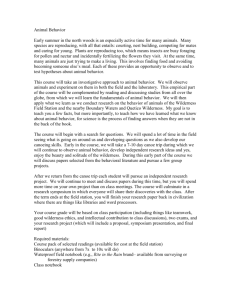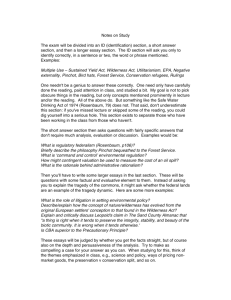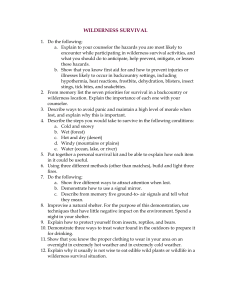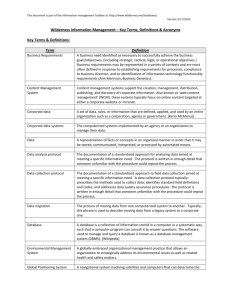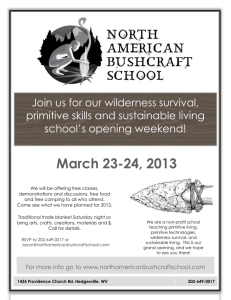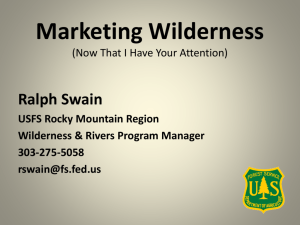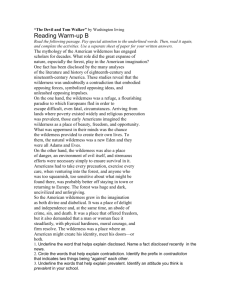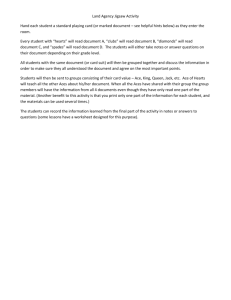RM 188 Summer 2012 - UVM Continuing Education
advertisement
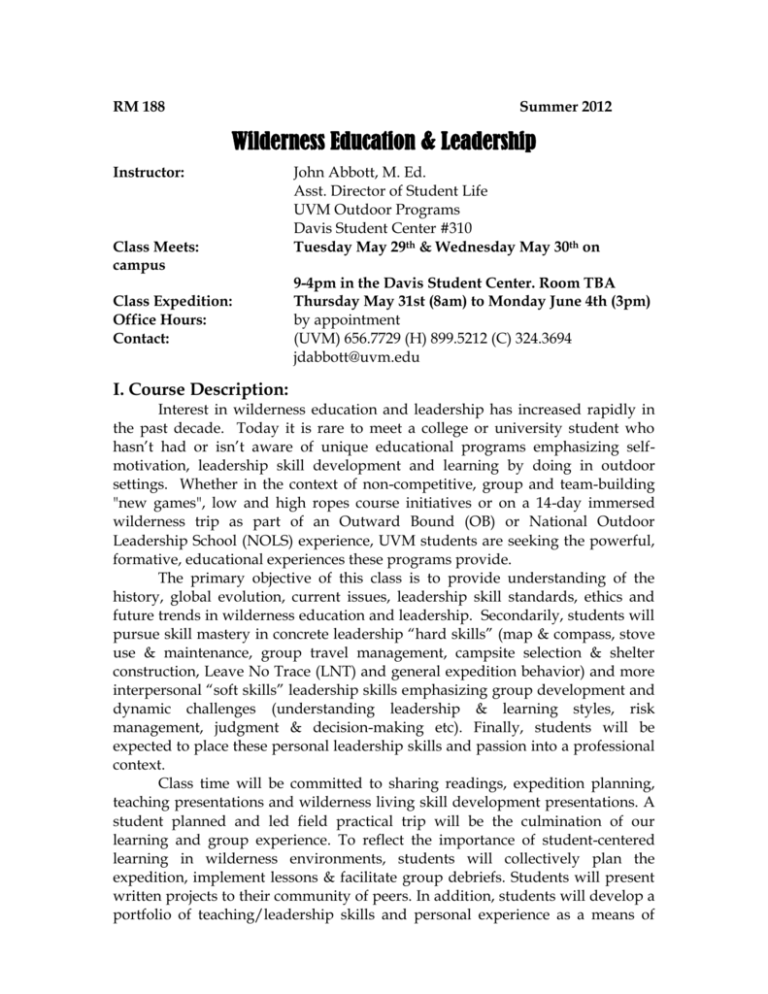
RM 188 Summer 2012 Wilderness Education & Leadership Instructor: Class Meets: campus Class Expedition: Office Hours: Contact: John Abbott, M. Ed. Asst. Director of Student Life UVM Outdoor Programs Davis Student Center #310 Tuesday May 29th & Wednesday May 30th on 9-4pm in the Davis Student Center. Room TBA Thursday May 31st (8am) to Monday June 4th (3pm) by appointment (UVM) 656.7729 (H) 899.5212 (C) 324.3694 jdabbott@uvm.edu I. Course Description: Interest in wilderness education and leadership has increased rapidly in the past decade. Today it is rare to meet a college or university student who hasn’t had or isn’t aware of unique educational programs emphasizing selfmotivation, leadership skill development and learning by doing in outdoor settings. Whether in the context of non-competitive, group and team-building "new games", low and high ropes course initiatives or on a 14-day immersed wilderness trip as part of an Outward Bound (OB) or National Outdoor Leadership School (NOLS) experience, UVM students are seeking the powerful, formative, educational experiences these programs provide. The primary objective of this class is to provide understanding of the history, global evolution, current issues, leadership skill standards, ethics and future trends in wilderness education and leadership. Secondarily, students will pursue skill mastery in concrete leadership “hard skills” (map & compass, stove use & maintenance, group travel management, campsite selection & shelter construction, Leave No Trace (LNT) and general expedition behavior) and more interpersonal “soft skills” leadership skills emphasizing group development and dynamic challenges (understanding leadership & learning styles, risk management, judgment & decision-making etc). Finally, students will be expected to place these personal leadership skills and passion into a professional context. Class time will be committed to sharing readings, expedition planning, teaching presentations and wilderness living skill development presentations. A student planned and led field practical trip will be the culmination of our learning and group experience. To reflect the importance of student-centered learning in wilderness environments, students will collectively plan the expedition, implement lessons & facilitate group debriefs. Students will present written projects to their community of peers. In addition, students will develop a portfolio of teaching/leadership skills and personal experience as a means of 2 understanding the process of professional development in the field of wilderness education. II. Objectives: Learning objectives for Wilderness Education and Leadership class: Students will develop an understanding of the history, theory and implementation of wilderness-based educational leadership & ropes course programs. Students will consider differing styles of teaching, facilitation and leadership in wilderness environments. Students will reflect on and cultivate a sense of personal teaching and leadership style. Students will consider historical and personal perspectives in defining a personal ethic in regard to: environmental impact, wilderness preservation and effective leadership interventions. Students will share wilderness education and leadership experiences and skills. Peer education in developing requisite "hard skills" (technical skill related to living in wilderness environments) and "soft skills" (interpersonal skills related to group dynamics and teaching) will be emphasized. Students will consider controversial issues in the field of wilderness education including: impact of communication & electronic devices in the backcountry, issues of personal & institutional liability and most importantly issues of social justice and lacking inclusion of under represented leader and participant populations. Students will demonstrate proficiency in the following areas: 1. Planning and leading a backcountry wilderness experience while minimizing environmental impact. 2. Exercising sound judgment and decision-making ability in leadership situations. 3. Understanding personal leadership/teaching style and areas of needed development within a global context. 4. Presentation of wilderness skill/leadership portfolio that emphasizes personal development. 5. Students will understand the differences between and connective threads binding, experiential, environmental, wilderness and adventure based education modalities. 6. Students will develop the ability to teach individually and facilitate group process as part of a leadership team. 7. Students will develop a leadership/teaching portfolio and resume’. III. Learning Activity, Evaluation & Grading: 2 3 Students will evaluate learning and development in a manner consistent with experiential education principles. Qualitative assessment based on personal insight and reflection will be emphasized. Learning modalities will include group discussion of reading, group skill development presentations, structured reflection/journaling and wilderness trip leadership experiences. Most importantly, students will be evaluated on attendance, participation and engagement in class activities. Evaluation and qualitative assessment of student skill development and contribution to team learning process will be weighed as follows: Class Attendance, Reading & Expedition Behavior 40 pts. Journals, Self-Reflection & Skill Inventory 20 pts. Hardskill & Situational Leadership Presentations & Preparation 40 pts. Evaluation of assignments will follow traditional grading scale: 98-100 A+ 94-97 A 91-93 A88-90 B+ 84-87 B 81-83 BEtc… Attendance, Punctuality & Participation Evaluation in this area reflects current wilderness education models of living in a backcountry community. Awareness of motivation levels, teamwork mentality, preparation, communication, risk taking and contribution to discussions/debriefs are integral leadership development values. Assigned readings are indicated in the syllabus. Students should always come to class having completed assigned reading and be prepared for interactive discussion. Participation in field practical is mandatory…No exceptions! Personal Skill Inventory & Journaling: Journaling presents the opportunity to capture a hallmark component of wilderness education...reflection and understanding of personal ability. Each class period students are expected to journal bi-weekly reflections on readings, presentations, group dynamics, leadership issues, ethical issues, skill development challenges, wilderness trip outcomes and emerging personal insight as a wilderness educator/leader. Journal entries (not to exceed two double spaced pages) are expected to connect personal thoughts to both assigned readings and topical content covered during class time. All journal entries will be submitted in hard copy in the beginning of the class they are due. Handwritten entries will not be accepted. A compiled hard copy of all journal entries will be collected for evaluation during our final class. 3 4 Individual Hard Skill Presentation: Students will develop an interactive lesson on a wilderness skill development topic of personal interest. Topic should be “hard skill” focused: a technical hard skill, teaching approach, skill development tip or leadership development strategy. Presentations are expected be well researched engaging, inclusive and clear. Presentations should mirror a "teachable moment" as they might manifest themselves in a wilderness setting. Presenters will benefit from feedback on style and content from the group. Team Situational Leadership Role Play: Group presentations should be developed to reflect role-modeled interplay between leadership team members and students in wilderness environments. While topics will vary widely in content, emphasis will be placed on the balance of the team teaching dynamic. Are learning objectives clear? Is content well conceived and organized? Is "air time" and personal contributions from leaders balanced? Is lesson timely and draw from the skills, experiences and perspectives of group members? Presentations will focus on philosophy, leadership and ethical issues presented in wilderness education communities. Assignment Reminders: 1. Journal assignment will be typed & emailed. Please no e-mailed papers or journal entries! 2. Journal Assignment is expected on Friday June 8th by 5pm! Late assignments will be assessed a single letter grade devaluation for each day late, unless prior discussion has taken place with instructor. 3. Unexcused absences will result in a semester end grade deduction of a percentage corresponding to the overall number of classes missed. RM 188 Bibliography: 1. "Effective Leadership" by Michael Gass & Simon Priest 2. "Backpackers Field Manual" by Rick Curtis, Princeton OA 3. "Wilderness Educator Notebook" by John Gookin, National Outdoor Leadership School (NOLS) 4
